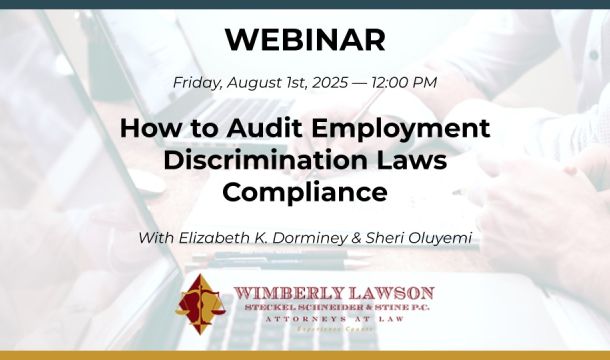FTC Adopts Rule Banning Non-Compete Agreements
On Tuesday, April 23, 2024, the Federal Trade Commission (FTC) voted 3-2, along party lines, to ban most new non-compete agreements and invalidate existing non-compete agreements. The new rule is scheduled to take effect in August – but lawsuits challenging this ban will be coming soon to a courthouse near you!
The FTC estimates that non-compete agreements affect 18% of employees -- nearly 30 million workers -- from CEOs to hourly fast food workers. The final rule bans new non-compete agreements for (almost) all workers and requires companies to inform current and former employees that existing bans will not be enforced. The only exception -- and a change from the proposed rule -- is that such agreements may remain in effect for senior executives.
The ostensible purpose of this ban is to prevent employers from unduly restricting employment options for former employees who may wish to work for a competitor. For example, an assistant manager for Burger-Rama now cannot be prohibited from taking a new job at Burger-Plex, even if she agreed not to work for a competitor for a period of time after leaving Burger-Rama.
During the notice-and-comment period that preceded the new rule’s adoption, employer organizations said non-compete agreements were critical for protecting proprietary information and intellectual property. The FTC points out that the new rule does not ban other methods for protecting that information, such as non-disclosure and confidentiality agreements. However, those agreements may be harder to enforce because violations will be harder to identify.
Businesses also questioned the agency’s authority to issue a blanket, retroactive ban: this is likely where the first lawsuits will strike. It’s one thing to ban prospective activity, but invalidating existing contracts with the stroke of a federal pen raises serious Constitutional issues under the Fourth Amendment’s takings clause.
The ban also raises questions about the power of an administrative agency, as opposed to duly elected legislators in Congress, to impose such a sweeping change. Recent decisions from the U.S. Supreme Court have focused on this, invoking the “major questions doctrine” to rein in administrative agencies and departments from adopting rules that broadly expand their power beyond the scope Congress has authorized. For example, in 2023 the Supreme Court held that the Occupational Safety and Health Administration (OSHA) and the Office of Federal Contracts Compliance Programs (OFCCP) lacked the power to impose COVID vaccine mandates on employers otherwise subject to their jurisdiction. That is too far removed from worker safety and health, or federal contracting, the Court said. If Congress wants you entering the public health field, they will let you know through legislation, but until then, stay out.
It seems likely that this law will be challenged even before the ink is completely dry, so do not worry about that August 2024 effective date just yet. In the meantime, as always, consider whether a non-compete is appropriate and desirable, considering your industry and your employees. And make sure that duration and geographic scope are not excessive, as many states have laws that will invalidate, or revise, a non-compete agreement they deem oppressive.
It should be noted that there are a few exceptions to the new regulation, including the bona fide sales of business, previously accrued causes of action, and policy – making positions above certain compensation levels where the non-compete clause is entered into prior to the effective date. It is not an unfair method of competition to enforce or attempt to enforce a non-compete clause or to make representations about a non-compete clause where a person has a good-faith basis to believe that the regulation is inapplicable. It should be noted that certain industries are excluded from coverage of the FTC as well.
And stay tuned – we will send out more Alerts as the situation develops.
Questions? Need more information? Call Betsy Dorminey at 404-365-0900.
Related Content
Get Email Updates
Recent Content

TPS Update (as of 2/6/2026)

Job Interviews Can Be a Good Selection Device

Suggestions on How to Diffuse a Tense Situation

Employers Blame Unions for Recent Shutdowns

$27 Million Verdict against Employer on Disability Discrimination over Refusal to Return Employee to Work



